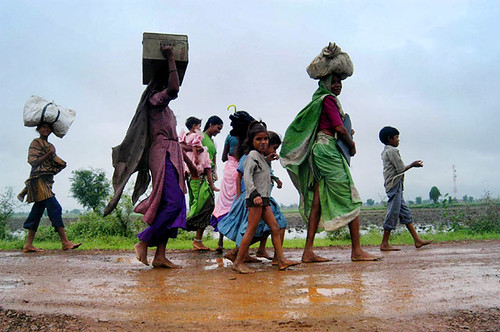"I suddenly remembered the tender concern with which the Supreme Court judges in Delhi (before vacating the legal stay on further construction of the Sardar Sarovar Dam) had enquired whether tribal children in the resettlement colonies would have children's parks to play in. The lawyers representing the Government had hastened to assure them that indeed they would, and, what's more, that there were seesaws and slides and swings in every park. I looked up at the endless sky and down at the river rushing past and for a brief, brief moment the absurdity of it all reversed my rage and I laughed."
Every so often I come across a reading for a course that makes my jaw drop and my blood boil... Arundhati Roy's essay The Greater Common Ground is one of those. If you have time, I recommend giving it a read, if not, I'll summarize as best I can.

Despite all the ecologial, environnmental and climactic consequences of building dams, there are also intensely heated social debates surrounding construction of dams in third world countries...
The River Narmada in India is just one example where the government proposes to build 30 large, 135 medium and 300 small dams in the water shed. In Fact, India now boasts of being the world's third largest dam builder. According to the Central Water Commission, we have three thousand six hundred dams that qualify as Big Dams, three thousand three hundred of them built after Independence. One thousand more are under construction.

And what a story it is.
"People say that the Sardar Sarovar Dam is an expensive project. But it is bringing drinking water to millions. This is our lifeline. Can you put a price on this? Does the air we breathe have a price? We will live. We will drink. We will bring glory to the state of Gujarat."
- Urmilaben Patel, wife of Gujarat Chief Minister Chimanbhai Patel, speaking at a public rally in Delhi in 1993.
"We will request you to move from your houses after the dam comes up. If you move it will be good. Otherwise we shall release the waters and drown you all."
- Morarji Desai, speaking at a public meeting in the submergence zone of the Pong Dam in 1961.
"Why didn't they just poison us? Then we wouldn't have to live in this shit-hole and the Government could have survived alone with its precious dam all to itself."
- Ram Bai, whose village was submerged when the Bargi Dam was built on the Narmada. She now lives in a slum in Jabalpur.
Yet one-fifth of India's population - 200 million people - does not have safe drinking water and two-thirds - 600 million - lack basic sanitation. They're a brazen means of taking water, land and irrigation away from the poor and gifting it to the rich. Their reservoirs displace huge populations of people, leaving them homeless and destitute.
Some estimates have been as high as 50 million people have been displaced by dams (their villages flooded), and what makes it even more sickening is that the majority of these people are tribal peoples who have been forced from their homes and way of life only to be lost in the slums (there have been reports that some have resorted to selling their babies to foreign adoption agencies to survive).
According to the Land Acquisition Act of 1894 (amended in 1984), the Government is not legally bound to provide a displaced person anything but a cash compensation. Imagine that. A cash compensation, to be paid by an Indian government official to an illiterate tribal man (the women get nothing) in a land where even the postman demands a tip for a delivery! Most tribal people have no formal title to their land and therefore cannot claim compensation anyway. Most tribal people, or let's say most small farmers, have as much use for money as a Supreme Court judge has for a bag of fertilizer.
The following snapped me into reality- prompting me to write about it:
The millions of displaced people in India are nothing but refugees of an unacknowledged war. And we, like the citizens of White America and French Canada and Hitler's Germany, are condoning it by looking away. Why? Because we're told that it's being done for the sake of the Greater Common Good. That it's being done in the name of Progress, in the name of National Interest (which, of course, is paramount). Therefore gladly, unquestioningly, almost gratefully, we believe what we're told. We believe that it benefits us to believe.
Allow me to shake your faith. Put your hand in mine and let me lead you through the maze. Do this, because it's important that you understand. If you find reason to disagree, by all means take the other side. But please don't ignore it, don't look away.
It's a hard pill to swallow, but isn't it true of any injustice happening in the world? My problem is that I come across stories like that all the time, I feel disgusted and saddened, but then I walk away and feel as if I am better for at least knowing. I convince myself that I am not like the people who are inflicting such injury on the poor, but if I don't do anything, am I much different?



No comments:
Post a Comment